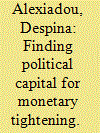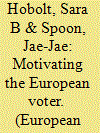| Srl | Item |
| 1 |
ID:
118530


|
|
|
|
|
| Publication |
2012.
|
| Summary/Abstract |
The dominant explanation of public attitudes vis-à-vis economic globalisation focuses on re-distributional implications, with an emphasis on factor endowments and government-sponsored safety nets (the compensation hypothesis). The empirical implication of these theoretical arguments is that in advanced economies, on which this article focuses, individuals endowed with less human and financial capital will be more likely to experience income losses. Hence they will oppose economic openness unless they are compensated by the government. It is argued here that including social capital in the analysis can fill two gaps in explanations relying on factor endowments and the compensation hypothesis. First, generalised trust - one key aspect of social capital - constitutes a personal endowment alongside human and financial capital. Second, structural social capital - another key aspect of social capital - can be regarded as a nongovernmental social safety net that can compensate for endowment-related disadvantages of individuals. Both aspects of social capital are expected to contribute, for distinct reasons, to more positive views on economic openness. The empirical testing relies on survey data for two countries: Switzerland and the United States. For both countries, the results indicate that generalised trust has a strong, positive effect on public opinion of economic globalisation, whereas structural social capital has no effect.
|
|
|
|
|
|
|
|
|
|
|
|
|
|
|
|
| 2 |
ID:
118532


|
|
|
|
|
| Publication |
2012.
|
| Summary/Abstract |
How do governments find the political capital to raise interest rates in pursuit of inflation stabilisation? Against common wisdom, this article shows that the ability of governments to exercise tight monetary policy largely depends on the level of unemployment insurance. Unemployment insurance is particularly useful to social democratic parties since their core constituency - labour - is the hardest hit by economic downturns. Empirical evidence from 17 OECD countries over thirty years demonstrates that high levels of unemployment insurance present a strong incentive for social democratic governments to respond more aggressively to positive changes in inflation. These findings resolve the puzzle of why partisan monetary cycles are not often observed in the literature and have important policy implications, given continued calls for scaling down social insurance.
|
|
|
|
|
|
|
|
|
|
|
|
|
|
|
|
| 3 |
ID:
118529


|
|
|
|
|
| Publication |
2012.
|
| Summary/Abstract |
Public evaluations of EU performance are not only critical indicators of the EU's output legitimacy, but also shape future support for European integration. For citizens to monitor the political performance of the EU they need relevant facts, yet it is anything but clear that gains in information about EU performance cause change in judgements about such performance. Drawing on two-wave panel data, this article examines whether acquiring information following a real-world EU decision-making event alters citizens' judgements about the utilitarian and democratic performance of the EU. It also examines how this effect differs for people with different levels of general political information. It is found that citizens who acquired performance-relevant information became more approving of the EU's utilitarian performance but did not change their judgements about its democratic performance. Also, individuals with moderate levels of general political information were affected most strongly by new facts about performance. The implications of these findings for EU-level representative democracy are considered.
|
|
|
|
|
|
|
|
|
|
|
|
|
|
|
|
| 4 |
ID:
118528


|
|
|
|
|
| Publication |
2012.
|
| Summary/Abstract |
Voters behave differently in European Parliament (EP) elections compared to national elections because less is at stake in these 'second-order' elections. While this explains the primary characteristic of EP elections, it has often led to a conflation of distinct motivations for changing behaviour - namely sincere and protest voting. By distinguishing these motivations, this article addresses the question of when and why voters alter their behaviour in EP elections. In addition, it argues that the degree of politicisation of the EU in the domestic debate shapes the extent to which voters rely on EU, rather than national, considerations. These propositions are tested in a multilevel analysis in 27 countries in the 2009 EP elections. The findings have important implications for understanding why voters change their behaviour between different types of elections.
|
|
|
|
|
|
|
|
|
|
|
|
|
|
|
|
| 5 |
ID:
118531


|
|
|
|
|
| Publication |
2012.
|
| Summary/Abstract |
How can democracies satisfy citizens' demands for legitimate decision making? This article reports findings from a randomised field experiment designed to mimic decision making in large-scale democracies. Natural collectives of individuals with a shared history and future (high school classes) were studied. They were asked to make a decision about how to spend a sum of money under arrangements imposed by the researchers and distributed randomly across classes. Within this setting, empirical support for three ideas about legitimacy enhancing decision-making arrangements is tested: participatory constitution-making; personal involvement in the decision-making process; and fairness in the implementation of arrangements. Throughout the analyses it was found that personal involvement is the main factor generating legitimacy beliefs.
|
|
|
|
|
|
|
|
|
|
|
|
|
|
|
|